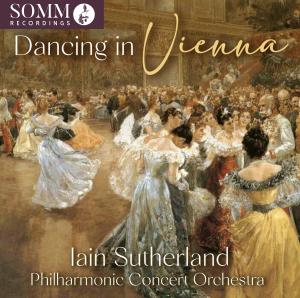CD REVIEW -
DANCING IN VIENNA
Philharmonic Concert Orchestra
conducted by Iain Sutherland
SOMM SOMMCD 0708
[78:15]

Such is the
mastery in this kind of music by
the Vienna Philharmonic Orchestra
with their annual albums, other
orchestras seem reluctant to make
full CDs of it. Exceptions in my
collection coming to mind are
Hallé/Barbirolli and Mantovani.
This release is of
live concert recordings made
circa the early 1990s by an
orchestra, comprising top players
from various orchestras appearing
for practical reasons as the
Philharmonic Concert Orchestra,
under the highly regarded now
veteran Scottish maestro Iain
Sutherland, several of whose
previous mainly SOMM discs have
been favourably reviewed here.
The opening number
of the 18 tracks is the
appropriately named Greetings
from Vienna March by Robert
Stolz (1880-1975), who wrote a
very much unappreciated funeral
march for Adolf Hitler ... while
the evil dictator was still alive
(!) and consequently had his
music banned throughout Greater
Germany. Stolz's Viennese Café
Waltz is also included. It was
his wife who wrote to Sutherland:
"You have a Viennese heart
with the golden arm for Viennese
music."
Unsurprisingly,
the bulk of the music are works
by the Strauss family, who were
the principal contributors to the
genre of Viennese light music. My
favourite Waltz and Overture
by "The Waltz King",
Johann ll (1825-99): Emperor
and Die Fledermaus are
among his half-dozen, finishing
the album with the Champagne
Polka by way of Long
Live the Magyar Quick polka,
Tritsch-Tratsch Polka
and Thunder and Lightning
Polka. But no Blue Danube!
Regarded by many,
reportedly including Johann, as
the most gifted of the family,
younger brother Josef (1827-70)
contributes Chatterboxes
(Plappermäulchen in
German) Quick polka, The
Dragonfly Polka-mazurka, Jockey
Polka and Fireproof!
"Anvil Polka"
Polka-française. The two
siblings jointly wrote the
ever-popular Pizzicato Polka.
Youngest sibling Eduard's
(1835-1916) Clear Track!
Quick polka was written for the
opening of a new railway company
in 1869.
The Opera Ball
Overture by Richard
Heuberger (1850-1914) and three Hungarian
Dances by mutual Strauss ll
admirer Johannes Brahms (1833-97)
complete the selection. There are
a few seconds of applause at the
end of each track throughout the
album.
Robert
Matthew-Walker's booklet notes
add value with fascinating
background information on the
pleasurable and very well played
music so fitting the opulence and
elegance of the Austrian capital
at the time. Sollen wir tanzen?
The remastering
again is in the capable hands of
Paul Arden-Taylor with Siva Oke,
who established the label in
1995, as Executive Producer.
©
Peter Burt, August 2025
|